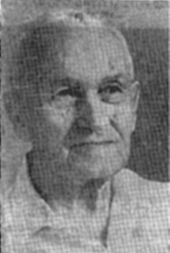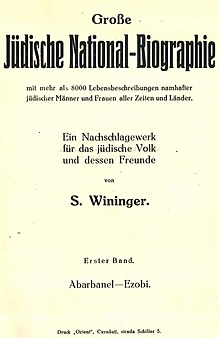Salomon Wininger
Salomon Wininger (born December 13, 1877 in Gurahumora , Austria-Hungary , † November 23, 1968 in Ramat Gan , Israel ; also Schlomo or Solomon Winninger ) was an Austrian-Israeli lexicographer who, with his Great Jewish National Biography, is the most extensive to date compiled bio-bibliographical personal reference work on Judaism .
Life
Salomon Wininger worked as an Austrian post clerk in Chernivtsi from 1910 until the First World War . During the World War he stayed in Vienna and then returned to Chernivtsi.
From 1907 he devoted himself - in addition to his professional activity - to work on the "Great Jewish National Biography". The biographical lexicon "Sefer Ishim Zionim" ( Book of Zionist Men ), which he also compiled with around 17,000 entries, was never published. The manuscript is in the Jewish National and University Library in Jerusalem. He founded numerous charities and people's kitchens as well as the Bukovinian pensioners' association for state officials.
Wininger survived the Holocaust in Chernivtsi and emigrated to Israel in 1951, where he was initially based in Jerusalem . From 1955 he lived in a retirement home in Netanya , later in Ramat-Gan .
Great Jewish National Biography
Winninger began in 1907 with work on the Great Jewish National Biography with more than 8000 biographies of well-known Jewish men and women of all times and countries - a reference work for the Jewish people and their friends in seven volumes ( Cernăuţi 1925–1936). He called it the attempt to create a "Monumentum Judaici nominis, a monument to the Jewish name and people, their spirit and their work". It contains around 13,000 more or less detailed “life descriptions of well-known Jewish men and women of all times and countries”, which also includes baptized Jews. It is one of the most comprehensive - if not the most comprehensive - works of its kind to date. The reference work contains many times the material compared to Adolph Kohut's (1848–1917) compilation “Famous Israelite Men and Women in the Cultural History of Mankind. Life and Character Pictures from the Past and the Present ”(2 volumes, Leipzig 1900/01), which is more often more inaccurate and faulty than Wininger's compilation.
In terms of its fundamental disposition and motivation, apologetic and in some details not free from errors, Wininger's “National Biography” is generally an immense collection of material, which otherwise preserves largely lost knowledge of Jewish cultural and political history.
Wininger's work was significantly advanced, albeit late, by the collection of approx. 1 million clippings from several hundred different newspapers and magazines "in most living languages" at home and abroad, which Carl Steininger set up in Dresden from 1914 on. The non-Jew Steininger (authorized signatory of Dresdner Bank, born in Salzburg in 1876) had only collected material on Jewish personalities and topics.
Jakob Fallenbaum (born in 1889 in Czernowitz), a “factory owner in Chemnitz in Saxony”, provided the financial means for the printing of the work, which was completed for years but has not been published. Volumes 1–5 were produced by the "Orient" printing company, while volumes 6 and 7 were produced by the "Tipografia ARTA" (F. Weiner-Ernst) printing company in Chernivtsi.
- Volume: "Abarbanel - Ezobi" (correct: Czernowitzer). 1925, 638 pages; Digitized version of the Goethe University Frankfurt / M.
- Volume: "Dafiera - Harden". 1927, 635 pages; Digitized version of the Goethe University Frankfurt / M.
- Volume: "Harischon - Lazarus". 1928, 639 pages; Digitized version of the Goethe University Frankfurt / M.
- Volume: "Leavith - Péreire". 1930, 637 pages; Digitized version of the Goethe University Frankfurt / M.
- Volume: "Pereira - Stone House". 1931, 637 pages; Digitized version of the Goethe University Frankfurt / M.
- Volume: "Steinheim - Zweig". - Addendum: "Abarbanel - Van Geldern". 1932, 639 pages; Digitized version of the Goethe University Frankfurt / M.
- Volume: Addendum 1: "Ge - End". - Addendum 2: "A - Z". - Attachment. 1936, 667 pages; Digitized version of the Goethe University Frankfurt / M.
From the preface
In the preface (Czernowitz 1925) Wininger et al. a .:
"...] Every people who lay claim to history and education, who wants to take an honorable position in the great book of world history, be it as a bearer of literature, art and politics, be it in the field of religion and science, should and must get to know his great men, those his leaders and heroes who have worked incessantly for the good of their nation; should get to know his ancestors by name, who in hours of distress committed their whole person, their goods and their blood for the religion of the fathers and the ancestral faith. […]
Every free nation loves to honor its great men with monuments and to immortalize their deeds in ore and marble. Only the Jewish nation, the homeless, which could be doubly proud of its greatness, since it first emerged from chains and bonds, only it does not honor it with such signs of recognition. Just as she always strived for spiritual treasures, as the only thing that could not wrest power from her, so she also erected spiritual monuments to them and those great names inherited in grateful memories from father to son, from century on Century. History has long since decided which monuments are nobler and more imperishable; Ilion lies in ruins and only faint traces speak to the wanderer, but Homer's blossoming chants live forever in the mouths of the people. [...]
I do not claim any other merit than collecting scattered things, refreshing forgotten things and having united the important Jewish men and women of all times and countries - as far as I could find biographical material for this - in one work.
May this national biography help promote the knowledge, love and enthusiasm for our religious and national ideals. May it instill self-respect in the readers as well as provide examples worth emulating. If I achieve this, it will be my greatest and greatest reward. "
literature
- Encyclopaedia Judaica . Vol. 16. Keter, Jerusalem n.d. (1971). Sp. 549.
- Susanne Blumesberger, Michael Doppelhofer, Gabriele Mauthe: Handbook of Austrian authors of Jewish origin from the 18th to the 20th century. Volume 3: S – Z, Register. Edited by the Austrian National Library. Saur, Munich 2002, ISBN 3-598-11545-8 , p. 1483.
- Hugo Gold : History of the Jews in Bukovina . Edition Olamenu, Tel Aviv 1962 (Volume 2).
- Renate Heuer : Bibliographia Judaica . (Volume 3, S-Z), Campus, Frankfurt am Main 1988, ISBN 3-593-33398-8 .
- D. Lazar: Obituary in Ma'ariv, December 20, 1968.
- Walter Tetzlaff: 2000 short biographies of important German Jews of the 20th century . Askania, Lindhorst 1982, ISBN 3-921730-10-4 .
- Kurt Schubert (Ed.): On the history of the Jews in the eastern countries of the Habsburg Monarchy (= Studia Judaica Austriaca , Volume 8). Edition Roetzer, Eisenstadt 1980, ISBN 3-85374-071-5 .
- Evelyn Adunka: Salomon Wininger. About the forgotten author of the "Great Jewish National Biography". In: Mnemosyne. ZEIT-Schrift für Jewish Kultur , Issue 26/2000, Alekto, Klagenfurt 2000, ISSN 1022-2642 , pp. 109–118.
Web links
- Literature by and about Salomon Wininger in the catalog of the German National Library
Individual evidence
- ↑ urn : nbn: de: hebis: 30: 1-148042
- ↑ Wininger erroneously lists him as a Jew in his National Biography.
| personal data | |
|---|---|
| SURNAME | Wininger, Salomon |
| BRIEF DESCRIPTION | Austrian-Israeli lexicographer |
| DATE OF BIRTH | December 13, 1877 |
| PLACE OF BIRTH | Gurahumora , Austria-Hungary |
| DATE OF DEATH | November 23, 1968 |
| Place of death | Ramat Gan , Israel |

